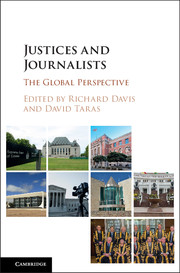Book contents
- Frontmatter
- Contents
- List of Contributors
- Acknowledgements
- Introduction: Judges and Journalists and the Spaces In Between
- 1 Judicial Communication: (Re)Constructing Legitimacy in Argentina
- 2 Communication beyond the Judgments: The Australian High Court, Speaking for Itself, but Not Tweeting
- 3 Uncommon Transparency: The Supreme Court, Media Relations, and Public Opinion in Brazil
- 4 The “Uncomfortable Embrace”: The Supreme Court and the Media in Canada
- 5 Germany: The Federal Constitutional Court and the Media
- 6 The Supreme Court and Media in Ghana's Fourth Republic: An Analysis of Rulings and Interactions between Two Estates of the Realm
- 7 The Puzzle of Judicial Communication in Indonesia: The Media, the Court, and the Chief Justice
- 8 Carping, Criticizing, and Circumventing: Judges, the Supreme Court, and the Media in Israel
- 9 Judicial Communication in South Korea: Moving toward a More Open System?
- 10 Changing the Channel: Broadcasting Deliberations in the Mexican Supreme Court
- 11 Norway: Managed Openness and Transparency
- 12 Judicial Institutional Change and Court Communication Innovations: The Case of the UK Supreme Court
- 13 Symbiosis: The US Supreme Court and the Journalists Who Cover It
- Conclusion
- Index
Conclusion
Published online by Cambridge University Press: 16 February 2017
- Frontmatter
- Contents
- List of Contributors
- Acknowledgements
- Introduction: Judges and Journalists and the Spaces In Between
- 1 Judicial Communication: (Re)Constructing Legitimacy in Argentina
- 2 Communication beyond the Judgments: The Australian High Court, Speaking for Itself, but Not Tweeting
- 3 Uncommon Transparency: The Supreme Court, Media Relations, and Public Opinion in Brazil
- 4 The “Uncomfortable Embrace”: The Supreme Court and the Media in Canada
- 5 Germany: The Federal Constitutional Court and the Media
- 6 The Supreme Court and Media in Ghana's Fourth Republic: An Analysis of Rulings and Interactions between Two Estates of the Realm
- 7 The Puzzle of Judicial Communication in Indonesia: The Media, the Court, and the Chief Justice
- 8 Carping, Criticizing, and Circumventing: Judges, the Supreme Court, and the Media in Israel
- 9 Judicial Communication in South Korea: Moving toward a More Open System?
- 10 Changing the Channel: Broadcasting Deliberations in the Mexican Supreme Court
- 11 Norway: Managed Openness and Transparency
- 12 Judicial Institutional Change and Court Communication Innovations: The Case of the UK Supreme Court
- 13 Symbiosis: The US Supreme Court and the Journalists Who Cover It
- Conclusion
- Index
Summary
The traditional image of courts of last resort is one of dignity and aloofness. Courts typically go to great lengths to foster such an image. They operate under formal processes and rigid bureaucratic procedures. They appeal to higher authorities, particularly supreme governing documents, which suggest personal biases of judges are minimal or non-existent. The members of such courts often adopt formal attire, particularly robes, and hold themselves to certain canons of ethical behavior.
This image would appear to distance these judicial bodies from political players advocating transparency and informality, particularly the press. Indeed, journalists would seem to be the polar opposites of judges sitting on high courts. They are typically perceived as hostile to authority, disdainful of bureaucracies, and suspicious of formal legal language that tends to obscure more than explain.
As one insider at the US Supreme Court noted,
there is an enormous cultural gulf between justices and reporters. Justices rewrite their opinions maybe fourteen times to get the precise nuance in each sentence. The reporters sit down in two hours and write a story that will be read by millions of people. There's a general feeling of discomfort.
Yet, as this volume has demonstrated, justices and journalists in various national systems do possess such a relationship. Indeed, it has become a common element across the globe. Moreover, it is not insignificant. That relationship affects public understanding of judiciaries, relationships between judiciaries and other political players, as well as a judiciary's ability to function as an arbiter of the law.
The nature of that relationship is shaped by the Court's role in the political system in which it is situated. Where courts are perceived as less autonomous and more influenced by other political actors, they may face the need to assert their independence as actors. As Scribner points out, this is particularly acute in Latin American nations. But it also true elsewhere, such as in Indonesia and Korea.
- Type
- Chapter
- Information
- Justices and JournalistsThe Global Perspective, pp. 297 - 304Publisher: Cambridge University PressPrint publication year: 2017



